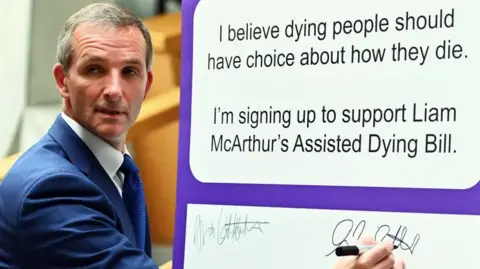Swinney will not support assisted dying in Scotland
First Minister John Swinney has said he will not support a bill which would allow assisted dying in Scotland.
Legislation to allow terminally-ill people to take their own life is being put forward at the Scottish Parliament by the Liberal Democrat MSP Liam McArthur and will be voted on by MSPs on 13 May.
If the bill passes it would allow a patient to request medical assistance to end their life, but only if they had a terminal illness and had been ruled mentally fit to make the decision by two doctors.
A Holyrood committee which is scrutinising the legislation has said members should vote at the first stage of the process as a "matter of conscience".
It is thought Swinney's decision to vote against the bill may sway some undecided MSPs, particularly in his own party.
The first minister told BBC Scotland News: "I've come to the conclusion that I can't support it (the legislation) because I'm worried that it would fundamentally change the relationships between patients and clinicians.
"I'm worried that some of the vulnerable in our society might feel that they are a burden and that they may therefore opt or feel under pressure to end their life prematurely."
The first minister said his religious faith was a factor and that he had "agonised" over his decision in a way that he did not on two previous assisted dying bills because he considered those to be bad law.
"I can't separate myself from my own judgements," he said.
"I'm a man of faith. I believe that we are all individually and equally created in the likeness of God.
"I also have my family perspective on this – my wife has a terminal condition and that is something we live with. I can't for a moment suggest that these real factors have had no impact on the decision I've made."
The stage one vote next week will be the third time in the Scottish Parliament's history that a vote will be held on this issue.
In 2010, the End of Life Assistance (Scotland) Bill failed, followed by an attempt in 2014 with the Assisted Suicide (Scotland) Bill.
The terminology may have changed, but the principle is much the same.
MPs in England and Wales voted in favour of a bill to allow assisted dying last year, by 330 votes to 275.
Like the UK parliament vote, Swinney said the Scottish government would not stand in the way of the legislation and that SNP MSPs would have a free vote.
The first minister said in October last year that he had "not come to a final view" on the issue but added that the initial proposed age threshold of 16 was "a very significant issue" in his mind.
Liam McArthur has since said he would raise the minimum age in the proposed legislation from 16 to 18.
The Lib Dem MSP said he had considered the matter "very carefully" and the change was in line with legislation in the US, Australia and New Zealand.
He has urged MSPs to vote in favour of the bill and help create "the most compassionate, safe and suitable law for Scotland".
The first minister has praised McArthur's efforts to produce "a more considered proposal" this time.
 Getty Images
Getty ImagesBut Swinney added: "I'm concerned that we don't have a guarantee that the legislation could essentially extend in scope beyond the decision in principle.
"I have agonised about this issue. I have been struck powerfully by the representations that constituents have made to me and others who have experienced a great deal of suffering amongst their loved ones.
"They wanted me to vote for this legislation and I'm sorry that I can't do what they want me to do. But I feel it's wrongly principled to go down this route and that's why I'll vote against it on Tuesday."
McArthur still believes there could be sufficient support at Holyrood for it to be approved in principle - though this is starting to look far from certain.
He said given Swinney's position on the issue in the past, he thought he was "unlikely" to win his support.
McArthur added: "Nevertheless, I would like to thank [the first minister] for his considered approach, the time he has taken to discuss the issue with me and his recognition that in this vote he does not speak for his party but solely on a personal basis."
'Divisive issue'
The Scottish bill has proved divisive, and is opposed by the Catholic Church in Scotland and the Scottish Association of Mosques.
Politicians including former First Minister Humza Yousaf and Labour MSP Pam Duncan-Glancy have also indicated they would vote against it.
The Church of Scotland is "partially opposed" to the legislation becoming law, but says its official position is currently under review.
Ally Thomson, the director of the Dignity in Dying Scotland pressure group, said she was "disappointed" with John Swinney's decision not back the bill but she appreciated that he "took the time to speak with dying people who are desperate for this choice".
She added: "The sad truth is that if MSPs were to vote against extending safe and compassionate choice to dying Scots many more terminally ill people will suffer and the harm created by the blanket ban on assisted dying will persist.
"Doing nothing is the worst thing Parliament can do here."
Alisdair Hungerford-Morgan, the CEO of the charity Right To Life UK previously said despite the age change the legislation "remains riddled with irredeemable flaws and inadequate safeguards", claiming terminal illness is "defined worryingly loosely".
Holyrood's health committee, which is scrutinising the legislation, has highlighted a number of areas it said required further consideration should the bill progress to stage two.
These include the provision and quality of palliative care, how to ensure the mental capacity of patients opting for assistance to die and the possibility of healthcare professionals being able to "opt-in" to the practice.
